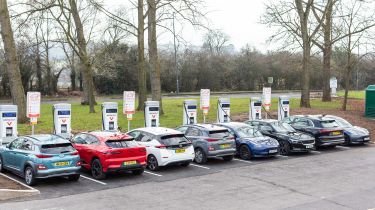Complete guide to the InstaVolt charging network
Need to charge up your electric car on the InstaVolt charging network? Here’s how it works

With more and more electric cars on the road, EV drivers want a dependable and easy-to-use public charging network – and InstaVolt is among the very best. The operator recently announced it has surpassed its 1,500th public charging point in April 2024, and it's still growing fast: the company wants to install more than 16,300 rapid chargers across the UK and Europe.
In fact, InstaVolt recently announced that between January and March 2024 it achieved a record quarter of installations, managing to install 128 chargers at 44 sites across the country. This includes InstaVolt’s most recent “superhub” at Syon Park in West London - fitted with 14 chargers offering speeds of up to 160kW - which the company states is the biggest of its kind in the borough area.
InstaVolt is not cheap as the firm has never been afraid of increasing prices. After costing 66p/kWh previously, the company then announced a cost rise to 75p/kWh on 15 November 2022 and has since increased even further to cost 85p/kWh. That’s against an average public charge rate of 74p/kWh.
You pay for the convenience, however, something that was backed up in the 2023 edition of the Driver Power car ownership survey, where InstaVolt placed third in the list of top 9 public charging providers, behind Tesla's Supercharger network and MFG EV Power - a position it also held in the 2022 version of the survey.
How to use the InstaVolt charging network and app
Electric-car drivers can check the availability of stations using the InstaVolt website or the InstaVolt smartphone app. An RFID (Radio Frequency IDentification) card isn't necessary to use the network, although you can request one through the company's app. Once you've parked up next to the charger, you simply swipe your bank or credit card on the reader, follow the instructions on screen, and plug the provided cable into your car.
InstaVolt didn't initially have its own app, relying instead on the mobile version of its website. Launched in 2021, the app remains optional; you don't have to download it to use InstaVolt chargers. It offers additional functionality, including a live map of InstaVolt’s network, a loyalty scheme that allows drivers to earn credit (called Volts) every time they charge and the ability to track charging history and issue receipts. Users can also remotely start a charge session from the app using stored payment details.
Where can I find InstaVolt chargers?
Most of InstaVolt's chargers were in England at first, but there are now a number of them in key locations across Wales and Scotland, too. InstaVolt has recently announced expansion plans for Portugal, Spain and Iceland, and had also promised sites in Ireland before the end of 2022. As of April 2024, however, the closest the company has come to this goal is a single charging station in Northern Ireland and no progress so far into mainland Europe.
In March 2024, InstaVolt announced a new CCO - Simon Smith - to spearhead and accelerate the growth into Europe, with the plans including a further 11,000 ultra rapid chargers within the UK and Ireland, more than 300 in Iceland and 5,000 in Portugal and Spain.
InstaVolt's network encompasses rapid chargers at 200 Costa Coffee Drive-Thru locations, offering charging speeds up to 120kW. The company is also installing fast chargers at some of the 1,300 McDonald's Drive-Thrus across the country and also announced an agreement with KFC to install chargers at up to 450 of the fried chicken chain's locations.
It is also looking to expand existing sites, including its popular hub location in Banbury near Oxford. The expansion, completed in March 2023 saw 16 new 120kW rapid chargers installed alongside the existing array of 16 rapid chargers, taking the total to 32 chargers. Included in this are “four fully accessible bays and four wider access bays” the company claims.
Further expansion of the InstaVolt network is on the horizon. In February 2022, the company was acquired by EQT Infrastructure, which has promised to "invest significantly in accelerating InstaVolt’s continued expansion of charge points across the UK and beyond".
How much does InstaVolt charging cost?
As of April 2024, InstaVolt charges 85p per kilowatt-hour – a rise from the previous price of 75p/kWh in March 2023 and 66p/kWh in 2022. This is an increase of a little over 142% in just under 3 years as drivers were previously paying as little as 35p/kWh to use the network in 2021. InstaVolt blames the increase on the rising cost of energy, plus its ambitious growth strategy. The company has recently announced it has joined forces with London’s black cab drivers to campaign against the government's 20% VAT rate on public charging; domestic tariffs attract a lower 5% rate.
The good news is that there are no connection fees or membership rates on InstaVolt charger. This means a full top-up of a Nissan Leaf with a 40kWh battery will cost around £34. As is the case with most other public networks, charging at home will almost certainly be cheaper: if your electricity tariff is around the UK average of around 32p per kilowatt-hour, the same full charge of a Leaf will cost just over £12 from a standard 7kW wallbox.
Payments are made using a contactless card: there’s no minimum payment, although the company says you’ll initially see a ‘pre-authorisation’ fee of either £15 or £30 appear on your bank statement. This will automatically be cancelled and replaced with the actual amount when you’ve finished charging. You can request a VAT receipt by sending the charger station name, time, date and charging cost to info@instavolt.co.uk or by creating an account and initiating your charge via the InstaVolt app.
How fast does InstaVolt charge?
This depends on the individual charging station: most are capable of 50kW or more; 250 chargers capable of 125kW were installed from August 2019 onwards, and newer InstaVolt chargers can charge at up to 150kW. Regardless of charging speed, the company claims that 100% of the electricity provided is produced by renewable sources.
At 50kW chargers, a 40kWh Nissan Leaf will take a 0-80% top-up in around 45 minutes, with a full charge taking closer to an hour. Meanwhile, a vehicle like the 90kWh Jaguar I-Pace will see a 0-80% charge in less than 40 minutes on InstaVolt's newer 125kW chargers.
InstaVolt’s charging stations all come with CCS and CHAdeMO cables installed, so you don’t need to bring your own. That said, many cars without CCS fast-charging technology aren’t currently able to use the InstaVolt network, and some owners of older Tesla Model S and Model X cars may need a special connector to make use of the CHAdeMO plug. Anyone who encounters an issue while charging can contact InstaVolt directly on a helpline that’s available 24/7: the number is 0808 281 4444.
